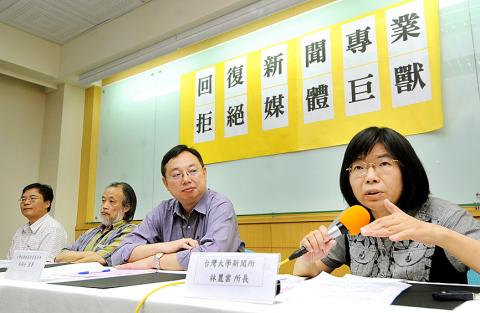|
Experts opposed to
Want Want merger
FIGHTING MONOPOLY: Want Want’s chairman said he
did not see what was wrong with using money from China’s government to run its
embedded advertising
By Shelley Shan / Staff reporter

Lin Lih-yun, director of the
Graduate Institute of Journalism at National Taiwan University, right, speaks at
the news conference in Taipei yesterday where 10 journalism and communication
school chairpersons jointly issued a statement opposing Want Want Broadband’s
bid.
Photo: Fang Pin-chao, Taipei Times
The heads of 10 journalism and
communication schools nationwide yesterday issued a statement opposing a bid by
Want Want Broadband to acquire the the cable TV systems owned by China Network
Service (CNS).
The statement is expected to be the focus of discussions at the legislature’s
Transportation Committee meeting today, when lawmakers review four nominations
for commissioner of the National Communications Commission.
The Want Want-CNS deal involves the merger of a media conglomerate owning
newspapers, magazines and TV networks with the nation’s second-largest multiple
service operator (MSO).
The commission has yet to approve the merger, which it has been reviewing for 16
months.
Three of the department chairs — Lin Yuan-huei (林元輝), chair of the department of
journalism at National Chengchi University; Lin Lih-yun (林麗雲), director of the
Graduate Institute of Journalism at National Taiwan University; and Hu
Guang-shiash (胡光夏), chair of the department of journalism at Shih Hsin
University — yesterday attended a press conference called by Taiwan Media Watch
board director Lin Fu-yueh (林福岳). Want Want China Broadband was represented by
special assistant to its chairman, Chao Yu-pei (趙育培).
Lin Fu-yueh said that the group of journalism department directors do not want a
media group to monopolize public opinion in Taiwan.
“We reviewed the performance of the Want Want China Times Group over the past
year or so and feel the group is not qualified to manage media,” they said. “We
are thus strongly against allowing such a group to manage even more media.”
The experts also listed several actions taken by the group that they said were
unprofessional and failed to live to up to its corporate responsibility,
including allowing the Chinese government to buy news coverage at the
Chinese-language daily China Times and lashing out at individuals and groups
with opposing views.
In response, Chao said Want Want China Broadband and Want Want China Times Group
were different companies, adding that the former was prepared to make 29
commitments if the Want Want-CNS deal were approved.
He said the China Times was fined NT$1.8 million (US$61,000) for allowing
embedded marketing by the Chinese government, and added that Want Want China
Broadband would have an internal review on all aspects of marketing.
Chao said the company would not give preferential treatment to channels from the
Want Want China Times Group, adding that media controlled by the group
represented only one of many different voices in Taiwan and it is unlikely that
the deal would monopolize opinions.
“We welcome specific examples about how stories in the China Times betrayed the
faith of Taiwanese, not abstract thoughts and observations,” Chao said.
Lin Fu-yueh said he had read the list of commitments and doubted the company had
the ability to keep them.
“If Want Want China Broadband and the Want Want China Times Group are indeed
unrelated, I could not help but ask why the latter defended the former by
devoting an entire page at the China Times to the coverage of a public hearing
on the deal,” he said. “Would you do the same if it was another group that
wanted to purchase the CNS? Would you give favorable coverage to that group,
too?”
Lin Lih-yun quoted Want Want chairman Tsai Eng-meng (蔡衍明), who said at the
public hearing earlier this month that he did not know what was wrong with
getting paid by the Chinese government to write news for them.
“The commission should have rejected this deal a long time ago because Tsai was
doing something illegal,” she said. “They should have revoked the licenses of
their television networks, too.”
The statement was drafted by Taiwan Media Watch and endorsed by: Aaron Chiu
(邱誌勇), chairman of the department of mass communication at Providence
University; Chen Chih-hsien (陳志賢), chair of the department of cultural
development at National Kaohsiung University of Applied Science; Mark Chen
(陳春富), chair of the department of communication arts at Fu Jen Catholic
University; Chen Ping-hung (陳炳宏), chair of the Graduate Institute of Mass
Communication at National Taiwan Normal University; Tseng Kuo-feng (曾國峰),
director of the department of radio and television at National Chengchi
University; Shaw Pin (蕭蘋), head of the Institute of Communications Management at
National Sun Yat-sen University; and Day Wan-wen (戴皖文), chair of the department
of communication at National Chung Cheng University.
|
![]()
![]()
![]()